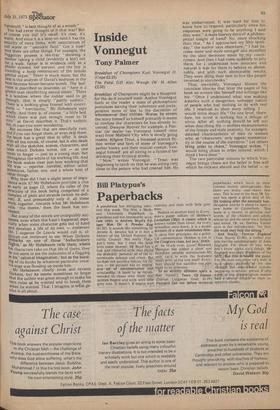Bill Platypus's
Paperbacks
A ponderous but intriguing selection this week. The first, a Methuen University Paperback (a grandiose and not necessarily accurate title), is Andrew Boyd's Fifteen Men On A Powder Keg (C1.50). It sounds like something by Jerome K. Jerome, but is in fact a history of the United Nations' Security Council. Not really Platypus's forte, but I read the book with some interest. Mr Boyd has a fast and colourful style that elic4S the dramatic, personal air of the' in:terminable debates and crises. But he does' not sacrifice history for fig-' tion his tfccount has an imkessive air Of documentation arid scholarSliip. A book to be eCoin-' mended to those who thinkthat' politics begins and ends with Rile grey men. It doesn't. It begins with
violence and ends with little grey men.
Politics of another kind in Everyman's paper edition of Hobbes's Leviathan (50p). A classic which is known rather than loved. As every schoolboy once knew, it is a model account of a state established firmly upon first principles. As a political commentator. Hobbes is not in the Cotgrave class, but as a' thinker' he rivals even Levin! Kenneth .Minogue has added a short and therefore sensible introduction.My , only cavil is with the fearsome 'small print of the text itself: EveryMan should not sacrifice our.,eyeSight to its ecOnomy. In an entirely different spirit is ;Jean Vanier's Tears ,Of Silence (Datton Longman Todd, ELIO). Platypus has not before reviewed paperbacks which have as their content mainly photographs. But there are many, and many fine ones. This is one of the best. Mr Vanier has spent a great deal of his life looking after the mentally handicapped, and he is about to open a new home in Canterbury. This book is a record, in pictures and words, of the children and adults whom he and his sister have helped and loved. Or. as Theresa Vanier says in her introduction, "so that the weak may help the strong." And finally, Forever England' (Tom Stacey £1 00), a rather coy title for the autobiography of John England. For those of you who don't know about such things, Mr England was Once President of the NUT.' But this is: besffie the point. For the man can ,write very well. It is i-..atUty acciatrit of his rise through our eductitfonal system, beginning in infants' school. It' only some of our present union leaders had a similar tongue in their respective cheeks.






























 Previous page
Previous page